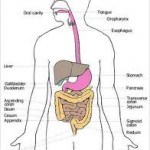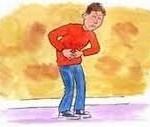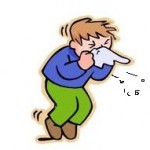As we grow old, our digestive system slows down, both in the motility of food mass and absorption of nutrients. Digestion starts with the first bite, where enzymes secreted in our saliva is mixed into the food we chew, progresses to the stomach where acid is used to dissolve as well as hydrolyse proteins and carbohydrates, to the small intestines where nutrients are further broken down and absorbed, and finally the remaining mass enters the large intestines where fluids and salts are taken up into the body.
When our digestion slows, less nutrients are taken up and more sugars and carbohydrates are left in the food bolus that travels along the small intestines and into the large intestines. The leftover food is also in the intestines longer due to the slower motility. The slow transit and the extra food is metabolized by the bacteria living in our gut and they multiply in numbers and produce more metabolic wastes, one of which is gas. This larger than normal amounts of gas causes us to feel bloated and is expelled from our bodies as flatulence.
Some medications may also increase flatulence. Antibiotics may disrupt the flora of the gut and leads to less absorption of nutrients and increase gas production. Drugs the decrease motility like benzodiazepines may also increase gas production. Medicines that blocks the absorption of carbohydrates and or fats will also increase the amount of nutrients available to the bacteria in the digestive system, leading to gas and bloating.
What can you do to minimize the gas production? Chew you food. Masticating food to finer bits allows for easier and faster digestion and absorption. It also allows more enzymes from the saliva to start the process of digestion earlier. Exercise will increase the tone of smooth muscles. These are muscles involve in moving food along the digestive organs. Increase tone means increase motility. Avoid foods that are known increase gas production in the gut. They are fruits and vegetable that are high in sugars and hard to digest fibres that are the perfect food for bacteria. Well known vegetables include beans, cabbages, peas, and cauliflower. Fruits that increase gas output include bananas, apples and dried fruits. Sugary drinks like soda and sugared beverages also increase the amount of gas production.
There are supplements and medicine that can help you with bloating and flatulence. If you experience persist and bothersome gas production, you should consult your doctor or pharmacist.








